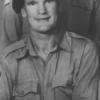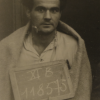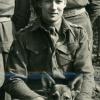“I suppose that my D-Day escapade started in the late afternoon of the 5th of June when we boarded trucks at our concentration area on Salisbury Plain to go the aerodrome at Fairford. As our convoy of trucks passed through the English countryside, there were groups of people in the villages who waved us farewell. Some of the women were in tears as if they guessed that something big was about to begin.
We arrived at Fairford in the early evening and were taken to our planes which were four engine Stirlings. Twenty Paras were allotted to each plane and all of our unit was unloaded. We then had parachutes issued and all this took time, it was getting dark by the time we were ready, we looked like a lot of little Michelin men; I was carrying as much equipment in weight as I weighed myself.
The Stirlings were large heavy planes. It was just like riding in a double decker bus, only nowhere near so comfortable. To get out of the plane, we had to waddle to the rear and drop out of a hole shaped like a coffin. There was plenty of back chat, they all had something to say, probably due to the excitement and nervous tension.
If you told me I could not go, I would have cried my eyes out, as would any of my mates in the platoon. You see we were all green, never having been in action before, we all wanted to have a go. We were all fully trained and honed to perfection. When we got near the dropping zone on France it was red light on, get ready to drop. The noise stopped – just men moving to the rear of the plane, the engines throttled back, then it was green light on – ‘GO’, and we were out and floating down over France.
It was so silent, where was the war? Where were the Germans? Then I looked below, where was the land? Below me all was water as far as I could see. I panicked and set off the air levers on my Mae West type jacket under my parachute harness (a big mistake). So there I was like a real Michelin man being dragged over the water by my parachute, not being able to release myself from the harness, but luckily one of my section was close by and he waded over and cut me free so that I was able to stand waist deep in water. We had landed in the flooded River Dives, so flooding the ground as an anti invasion obstacle and we were in fact miles from our objective.”
Bill Elvin encountered the Germans; he and five others had no idea where they were or where any of the others were as it was pitch black and silent. They got themselves out of the water, chose a direction and set off.
“We had not gone far down the road when an order was given in German. Two bursts of machine gun fire and grenades were directed at us and then silence. I dropped to the ground, flat as I could get, my heart thumping and thinking that after all the hard training I had been through, now I was going to be killed without even seeing a German. When we came to our senses there were only three of us left, where the other three went we did not know. Their bodies were not there, so they must have scattered in the confusion and not been killed.
We carried on down the road and came to a farm just off the road with the buildings partly submerged. There was a faint light showing in a downstairs room, the occupants no doubt having been awakened by the firing. Now we had a chance to find out where we were! So I knocked on the door while two others kept me covered with their weapons in case a German came to the door. Nobody answered, but a face appeared at the window. It was a man with a moustache and glasses. He shook his fist at us and made gestures for us to go away. We did not argue. We pretended to go away but went round the other side of the farm and into a barn. The barn had a second floor, so we decided to go up there, rest and to have a view all round in case any Germans came down the road. We were all wet through and had to sort our equipment out. We came to the conclusion that if we waited until dawn, we would have a better chance of getting back to our battalion in the daylight. We still had not got a clue as to where we were.”
By the time dawn arrived Bill Elvin and his party had dried out a little in the barn.
“So we made a move out of the farm and onto the road. In daylight we could see that each side of the road was flooded, but we made our way up the road and after going about a mile we could hear firing in the distance and so we knew that a battle was taking place. In time we came to a driveway leading to a large house about 400 yards away. At the house we could see what appeared to German soldiers on guard, so it was back into the water to make our way past, hoping we had not been seen. Nothing happened so we made our way back down the road.
About 5 minutes later we came across a Frenchman and his wife coming down the road. The only thing we could understand was that there no Germans the way we were going. So we carried on for a while and then saw men in the distance. We moved cautiously forward until we could recognise that they were Paras. When we got to them, it turned out that it was the 1st Canadian Para Battalion who were about to withdraw after using a bridge that they had blown up as a roadblock. So, into the water again we went and, holding onto debris of the bridge, crossed to the other side and withdrew with the Canadians.
As we withdrew, we saw signs of a battle. Paras were hanging from the high tension cables stung from pylon to pylon, their chutes caught in the cables from which they could not free themselves and that was where they met their deaths.
We withdrew with the Canadians all that day, those in front clearing away any German opposition. (It was only light opposition, the Germans not having recovered from the shock of the airborne landings. This was only D Day and no doubt would soon recover.)
Later that evening we ended up at the 3rd Para Brigade Headquarters at Le Mesnil. It was a very noisy night so by midnight on D Day, although I knew where I was, I had still not joined up with my battalion.
D Day plus one, in the morning we were loaded onto a jeep to take a very hairy journey to 5 Para Brigade HQ. The two brigades had not yet joined up, and there were still German positions in between the two. I got back to 4 Platoon B Company 7th Battalion at about 11.30am. They were dug in opposite Ranville church. In the distance I could see wrecked gliders and Germans beginning to infiltrate them. We were being shelled spasmodically. I shared a trench with Private Bushell who told me what had happened. On the west side of the bridges over the Orne and the canal, several men were missing from the platoon.
I was back where I should have been after taking a roundabout route. I felt safe to be with my old mates. Little did I know that by D plus 12 it would be a very small platoon, with the company commander and platoon officers wounded, the company sergeant major killed, many NCOs I had trained with gone, killed, wounded or missing. B Company bled to white to hold the Germans back from retaking the bridges and pushing the bridgehead back into the sea.”





Latest Comments
There are currently no comments for this content.
Add Comment
In order to add comments you must be registered with ParaData.
If you are currently a ParaData member please login.
If you are not currently a ParaData member but wish to get involved please register.